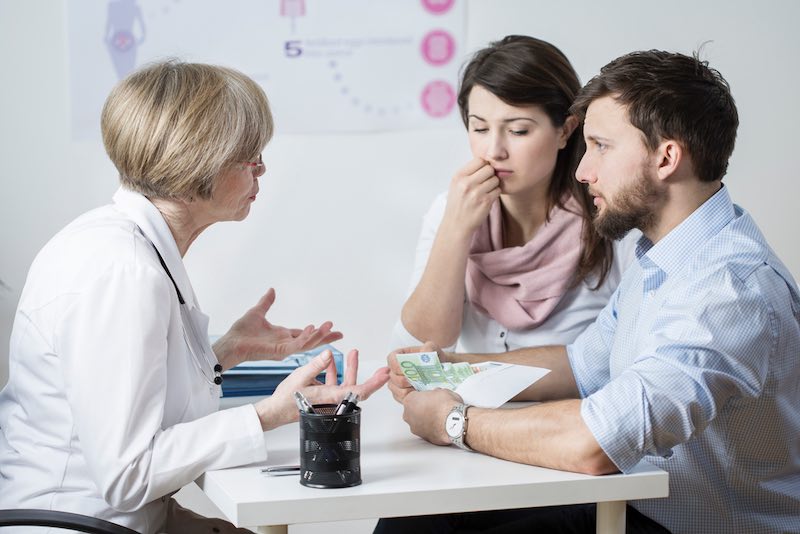What is infertility and how to treat it?
Almost one in five couples in the Czech Republic suffer from infertility. Men suffer from infertility, as do women, and often both are infertile. If a man and woman fail to conceive after a year of unprotected intercourse, it is time to consult specialists. Thanks to IVF and assisted reproduction methods, it is possible to help most who long for their own offspring. Doctors and gynaecologists are able to accurately diagnose the problem and also determine the best methods for getting pregnant. Thanks to state-of-the-art in vitro fertilisation methods, including donated egg treatment, doctors can help most couples fulfil their dream of a family.
What is Infertility?
By medical definition, infertility is the inability to conceive a child during one year of unprotected sex. Infertility in men is manifested by reduced quality or the absence of sperm. In women, poor quality eggs, disorders in their formation or the woman's inability to carry a baby after conception. There are many factors that cause infertility. According to the World Health Organization (WHO), infertility is a disease, and as with many other diseases, medical science has ways to treat it.
Infertility treatment is often the only way to deal with this health problem and have a child of your own. Many causes of infertility are biologically determined and, thanks to modern medicine, can be treated. Experienced experts in IVF clinics use very effective methods in the treatment of infertility, in which they proceed from the simplest to the most complicated. Thanks to this, it is possible to guarantee the greatest possible efficiency and a chance to overcome any problems with conceiving a child.
The causes of infertility are varied and often a combination of several factors. But modern medicine can help solve a couple's infertility in almost 90% of cases. However, it is necessary for both the woman and the man to undergo an examination. This is the only way to ensure a 100% diagnosis and subsequent effective solution.
Factors causing infertility in women:
- Endometriosis
- hormonal imbalance
- blocked fallopian tube/s
- genetics
- lifestyle
- host environment of the uterus for sperm
- problems with implantation and egg nesting
Factors causing infertility in men:
- poor quality sperm (amount of sperm, their motility, viscosity and pH of sperm, damaged DNA)
- hormonal imbalance
- obstruction of the vas deferens (sperm duct)
- genetics
- lifestyle
- autoimmune reaction of the male body to sperm
- sexual problems (impotence, ejaculation problems)

Infertility treatment- IVF
Infertility treatment, assisted reproduction or artificial insemination are all terms for a form of treatment during which eggs or sperm (i.e., germ cells) are manipulated to successfully unite them and then nest the egg in the uterus.
All couples who decide to be treated at an IVF clinic will first undergo a comprehensive examination, during which their current health status, possible genetic burden, as well as family and personal history will be ascertained. Based on this information, the doctor will then propose the most appropriate treatment. There are a number of treatment methods in assisted reproduction:
- ovarian stimulation and monitoring of fertile days for planned sexual intercourse
- IVF (in vitro fertilization) - artificial insemination with own eggs with or without hormonal stimulation / artificial insemination with donated eggs with the need for hormonal stimulation
- FET (frozen embryo transfer) - insertion of one's own or donated embryo into a woman's uterus
Artificial insemination can be performed using your own sperm and eggs, fertilising a donated egg with your partner's sperm, fertilising your own egg with sperm from a donor, or using both donated egg and sperm from anonymous donors. Once the doctor has determined the cause of infertility, they will suggest the most appropriate treatment procedure. The IVF specialists and all the staff at the clinic are always available to advise on any questions related to the treatment.
Conditions for the treatment of infertility in the Czech Republic
There are a number of renowned IVF clinics in the Czech Republic that meet the legal requirements and rules for artificial insemination as directed by Czech legislation. For women, their age on the day of commencement of assisted reproduction must not exceed 48 years. Only male and female couples can apply for assisted reproduction, not single women or lesbian couples. It is not possible to choose the sex of the future baby when undertaking artificial insemination.
Assisted reproduction clinics also carefully select egg donors. Only adult women under the age of 33 years are eligible for the donation program. They must be in good health and be psychologically sound and have at least a high school education. Potential donors must undergo an initial interview, where they will discuss their personal and family history, gynaecological examination and blood and urine analysis with the doctor, which will eliminate the risk of various diseases. If all is well, it is possible to proceed with the donor's hormonal stimulation and egg collection. In addition to a comprehensive overview of her health, the donor will also receive financial compensation for donating eggs. Egg donation can be repeated up to three times under applicable laws.






